Religion and spirituality are not the same things. They are, however, commonly confused. “She goes to church every week,” we say. “She’s a very spiritual person.” Or we note that, “He’s a staunch member of the parish finance committee. He’s a very spiritual person.” It’s an interesting conjunction of unlike ideas. It’s the equivalent of saying, “She’s an excellent vocalist. She’s been taking singing lessons for years.” There’s certainly a connection between taking voice lessons and becoming a professional vocalist, but it’s not a necessary one. The truth is that we can go through the motions about something all our lives and never really become what the thing itself is meant to make us.
Religion and spirituality are like that, too. The one, religion, has to do with leading us to an awareness of God. The other, spirituality, has to do with transforming the way we live out that awareness. Sometimes we stop at one and fail to become the other.
It’s when we make religion itself our substitute for God that, ironically, our spirits stand to wither or calcify. The ancient spiritual masters understood the confusion only too well.
They wrote: Once upon a time, as the Master lay dying, the disciples begged him, for their sakes, not to go. “But if I do not go,” the Master said, “how will you ever see?”
“What are we not seeing now that we will see when you are gone?” they asked.
And the Master said, “All I ever did was sit on the river bank handing out river water. After I’m gone, I trust you will notice the river.”
Religion is only a bridge to God—and sometimes even an obstacle.
The difference between religion and spirituality is the difference between orthodoxy and mysticism. The orthodox are those who keep the rules and guard the creeds of all the denominations of the world. They know a heretic when they see one.
The mystics of every religion are those who are looking for more than the security that the rules give in order to absorb the spirit to which the rules are meant to refer. They go beyond theology to immerse themselves in the reality which the rules are designed to prepare us to see and the theology is meant to describe. They go beyond ritual to the reality to which it points. They melt into God. They embrace the whole world. They become love and compassion.
Mystics go beyond the norms of every religion to the God every religion is established to revere. Then, denominational boundaries disappear, differences dissolve, theological distinctions become meaningless and we find ourselves welded to the presence of God here and now. In everything. Everywhere. At all times.
The Sufi poet Hafiz put it this way:
The great religions are the ships,
Poets the lifeboats.
Every sane person I know has jumped overboard!
That is good for business, isn’t it, Hafiz?
THURSDAY, AUGUST 1: It is very easy to be “religious.” All we have to do is to keep the rules. The question is, What for? And does it mean anything to anyone but me? If not, is it really religion at all?
FRIDAY, AUGUST 2: Sometimes we’re religious in order to guarantee a payoff at the end of life. The truly religious person, the person who is actually “spiritual,” on the other hand, is walking a bridge between time and eternity with an eye to having one dissolve into the other even here.
SATURDAY, AUGUST 3: Spirituality is what carries us, leads us, drives us between religious or spiritual “exercises.” It’s the way we go about life on a daily basis because of what we say we believe.
SUNDAY, AUGUST 4: If religion is so sanctifying, why is it that there are so many wars, so much killing, such unlimited oppression, so much religious support for state violence? Maybe it’s because what religion is lacking is spirituality—the spirit of the God it preaches.
MONDAY, AUGUST 5: Spirituality is the way we respond to God. It is life according to the spirit of God. That’s a far piece from life lived according to the rules.
TUESDAY, AUGUST 6: “To sin it is not necessary to break the rules,” the sage said. “Just keep them to the letter.” It is more than possible to make rules the reason for our existence, the measure of our souls. But when rule-keeping takes precedence over the very essence of spirituality—justice, compassion and union with God—rules become the very thing that can destroy the reason for our existence.
WEDNESDAY, AUGUST 7: People kept the rules in Nazi Germany and destroyed the spirit that the Gospels came to teach. Ironically enough, it was the spirit that Germany needed, not the rules. Their new rules about euthanasia, antisemitism, in fact eventually led to their destruction. The same thing can happen to us.
THURSDAY, AUGUST 8: In the 12th century, spirituality came to mean “not corporeal,” “not material,” “not of the body.” But that kind of spirituality can lead us to devalue the beautiful, the sensual, the physical and the real. It can even lead us to devalue ourselves. It says that what God has given us to take us to the divine is itself bad.
FRIDAY, AUGUST 9: The notion that to be spiritual we need to devalue the material is an idea that comes from pagan Greece. The new group of philosophers, those who loved wisdom, glorified the mind when the religion of Greece ceased to persuade. But the devaluation of matter is not the incarnational insight of a Christian. The birth of Jesus reminds the Christian that everything about life—the body, the parties, the people around us, the work—is all sacred.
SATURDAY, AUGUST 10: Spirituality is what takes us beyond religious practice to the purpose of religion: the awareness of the sacred in the mundane.
SUNDAY, AUGUST 11: We wonder how it is that religion can do so much violence, feed on so much extremism, lead to such self-destruction. The answer is, of course, that that kind of religion is not about coming to the spirit of God. It has stopped short of God because it has its own agenda: control, perhaps; vengeance, maybe; fear, for sure. But God is in none of those things. “Every day,” Lenny Bruce says, “people are straying away from the church and going back to God.”
MONDAY, AUGUST 12: Religion is the glue of a society. It teaches ethics and community and awareness of God. It brings us to the starting point of a holy life. The rest is up to us.
TUESDAY, AUGUST 13: When religion requires that our humanity with all its joy and all its sense of goodness be stamped out, there is something wrong with that religion. “We are not human beings trying to be spiritual,” Wayne Dyer says. “We are spiritual beings trying to be human.”
WEDNESDAY, AUGUST 14: Sins committed in the name of religion are still sins. When Christian Crusaders conquered Jerusalem in 1099, they massacred every Muslim man, woman and child in the city, 70,000 of them. When Saladin, the Muslim general, retook the city for Islam 100 years later, the Christian population was treated “with the generous leniency of Islam’s highest ideals for the conduct of war.” Which of the two were really religious then?
THURSDAY, AUGUST 15: Religion is meant to develop in us the disciplines and sensitivity and regularity that enable us to direct our lives toward the sacred in all circumstances at all time. Or as Christina Baldwin put it, “The spiritual journey is the soul’s commingling with ordinary life.”
FRIDAY, AUGUST 16: Religion itself is not sacred. And, if or when it pretends to be, it can stop a soul in mid-flight from ever being able to find God in the midst of life. Then we make the means the end. Then we take a spiritual process designed to help us find God in life and turn it into God. And that is a weak and pathetic substitute.
SATURDAY, AUGUST 17: Religion can be addictive. We can miss all of life around us where God really is because we are too busy being religious to notice. Kaplan puts it this way, “People whose religion begins and ends with worship and ritual practices are like soldiers forever maneuver-ing, but never getting into action.”
SUNDAY, AUGUST 18: When we were young sisters, we were not permitted to go to the chapel between community prayer times. “Do not wish to be called holy before you are holy,” we read in The Rule of Benedict.
MONDAY, AUGUST 19: My novice mistress wasn’t interested in pseudo-saints. She didn’t want us sitting around waiting for God to find us. She wanted people who took God with them everywhere they went.
TUESDAY, AUGUST 20: When we turn the God of love into the God of law, we have missed God entirely. “There is no religion without love,” Anna Sewell wrote, “and people may talk as much as they like about their religion, but if it does not teach them to be good and kind to human and beast, it is all a sham.” A sham.
WEDNESDAY, AUGUST 21: The fact that I can drive a car tells me little or nothing about its inventor. That’s what reading about religion tells me about God. Religion is something that is meant to be lived, not studied.
THURSDAY, AUGUST 22: Jesus didn’t preach a religion. He never said a word about how to celebrate Jewish holy days, for instance, or what pronouns to use when praying or how to conduct the sacrifices. Jesus preached God and the coming of the reign of God. They are two different things.
FRIDAY, AUGUST 23: Until there is in us no difference between the sacred and the secular, the material and the spiritual, there is no spiritual in us.
SATURDAY, AUGUST 24: Spirituality asks the question, Where is God for you? Then, when you know the answer to that, the message is—do more of it.
SUNDAY, AUGUST 25: “Rub your eyes and be awake,” Mikhail Naimy wrote. Look for God where God is—in front of you. Religion is the rubbing of the eyes; spirituality is coming to see.
MONDAY, AUGUST 26: Every religion uses some kind of prayer aids—rosaries, stations, sitting meditation, candles—to bring us into the presence of God—which means, of course, to bring us into the center of ourselves where God dwells.
TUESDAY, AUGUST 27: A “prayer aid”—a rosary or a candle, for instance—is something “religious.” The awareness of the presence of God here and now, on the other hand, is “spiritual.” They go together, yes, but it is possible to be in the presence of God without lighting a candle and it is also possible to light a candle and be completely oblivious of the presence of God everywhere around us.
WEDNESDAY, AUGUST 28: Is one place more religious than another? Is a monastery holier than a home, for instance? Amma Syncletica, one of the desert moth-ers said, “It is possible for one who is a solitary to live in a crowd of personal thoughts. And it is also possible to be a solitary in one’s mind while living in a crowd.” What counts is only whether we are conscious of God wherever we are.
THURSDAY, AUGUST 29: Religion is the storehouse of tradition, the keeper of historical memories of sanctity, the doctrines and dogmas that call us back again and again to who and what we are supposed to be. It is the finger pointing at the moon; it is not the moon.
FRIDAY, AUGUST 30: It’s not the body or the mind that keeps us going in hard times. It is the quality of the spiritual life within us. Emerson said, “The foundations of a person are not in matter but in spirit.” Not to feed the spirit is to starve life of its purpose when we seem to have none.
SATURDAY, AUGUST 31: Or as Dante Gabriel Rossetti put it, “The worst moment for an atheist is when he is really thankful, and has nobody to thank.”
LET’S SHARE OUR THOUGHTS
The following discussion questions, Scripture echo, journal prompts, and prayer are meant to help you reflect more deeply on The Monastic Way. Choose at least two suggestions and respond to them. You may do it as a personal practice or gather a group interested in sharing the spiritual journey.
DISCUSSION QUESTIONS
1. Do you agree with Joan Chittister’s explanation of the distinction between religion and spirituality?If not, how would you differentiate between them?Or do you see them as one and the same? Why?
2. Which daily quote in The Monastic Way is most meaningful to you? Why? Do you agree with it? Disagree? Did it inspire you? Challenge you? Raise questions for you?
3. After reading The Monastic Way write one question that you would like to ask the author about this month’s topic.
4. Joan Chittister uses other literature to reinforce and expand her writing. Find another quote, poem, story, song, art piece, or novel that echoes the theme of this month’s Monastic Way.
5. Sister Joan writes, “Religion is the storehouse of tradition, the keeper of historical memories of sanctity, the doctrines and dogmas that call us back again and again to who and what we are supposed to be. It is the fingerpointing at the moon; it is not the moon.” What is your current relationship with religion? With spirituality?
JOURNAL PROMPTS
Prompt 1: Here are a few statements from this month’s Monastic Way. Choose one that is most helpful to you and journal with it.
•When we turn the God of love into the God of law, we have missed God entirely.
•The birth of Jesus reminds the Christian that everything about life—the body, the parties, the people around us, the work—is all sacred.
•A “prayer aid”—a rosary or a candle, for instance—is something “religious.” The awareness of the presence of God here and now, on the other hand, is “spiritual.” They go together, yes, but it is possible to be in the presence of God without lighting a candle and it is also possible to light a candle and be completely oblivious of the presence of God everywhere around us.
Prompt 2:Spend a few minutes with this photograph and journal about its relationship to this month’s Monastic Way. You can do that with prose or a poem or a song or....
PRAYER
“Prayer for Dialogue with Greater Religions”
I bow to the one who signs the cross.
I bow to the one who sits with the Buddha.
I bow to the one who wails at the wall.
I bow to the OM flowing in the Ganges.
I bow to the one who faces Mecca, whose forehead touches holy ground.
I bow to dervishes whirling in mystical wind.
I bow to the north, to the south, to the east, to the west.
I bow to the God within each heart.
I bow to epiphany, to God’s face revealed.
I bow. I bow. I bow.
—Mary Lou Kownacki
SCRIPTURE ECHO
“This is what God asks of you, only this: to act justly, love tenderly and walk humbly with your God.”
—MICAH 6:8

 Artwork: by Jo Clarke
Artwork: by Jo Clarke




